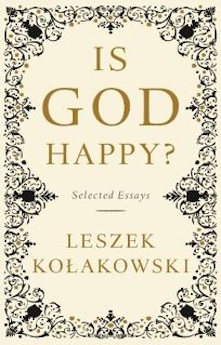By Peter Weigel
Philosopher and intellectual historian Leszek Kolakowski probes the ambivalent harvest of modern rationalism in a posthumous collection of essays on politics, religion, philosophy, and morality. Born in Poland, Kowlakowski (1927-2009) was a philosophy professor at Warsaw University. Disillusionment with his youthful communism culminated in exile in 1968. He settled at Oxford with stays in the US. His three-volume Main Currents of Marxism: The Founders-The Golden Age-The Breakdown in the 1970s established him as a prominent critic of twentieth century communism. He also increasingly delved into theological controversies shaping modern thought. Often self-effacing, Kolakowski’s clear, insight-laden prose shows a skilled professional philosopher able to write in an attractive and accessible manner for the generally educated reader. Part I is on communism, Part II on religious faith, and Part III emphasizes modernity’s effects on morality and truth-seeking.
Part I develops Kolakowski’s signature positions on communism: Leninist-Stalinist communism is a valid interpretation of Marx; Marx’s historical materialism and socio-economic predictions are explanatory failures; Marxist principles lead to the mass violence and despotism writers predicted in the nineteenth century before the revolutions of the twentieth. (“Marxist Roots of Stalinism,” “What is Left of Socialism?”) Thus, Kolakowski argues, Western intellectual supporters ill-excuse themselves by distinguishing pure theory from actual communist regimes. Marxist principles were absorbed into post-War continental philosophies which swept the academy (structuralism, post-structuralism, et al.) and still shape the climate of inquiry in a number of academic disciplines (“Heritage of the Left,” volume three of Main Currents of Marxism). Kolakowski seems hard on Marx to some, e.g., the early Marx some think more humane. Yet, even defenders must contemplate why Utopian adaptations of him by states unraveled in Orwellian nightmare, as Kolakowski argues in “My Correct Views on Everything,” an amusingly satirical (most think devastating) reply to an open letter by British Marxist historian E.P. Thompson. Because socialism speaks for the underdog, Kolakowski holds it “still has its uses” as an ideal but not a system. He also is no apologist for uncontrolled capitalism. The acute social problems of the nineteenth century Industrial Revolution dethroned egoism and greed as guardians of happiness. Totalitarianism and ideological fanaticism in general foster disregard for truth and individual worth.
The second section on religion starts with “Jesus Christ–Prophet and Reformer,” an admiring compendium of Christ’s philosophy—love over law, voluntary solidarity, non-violence, God for all people. Society has lost “the certainty of faith” but lacks “the certainty of unbelief.” Enlightenment atheism claiming to free people from superstition created a civilization of “endless anxiety and suffering.” Yet, Western civilization lost its faith mainly due to ethical scientism, conceived as reducing all value to physical comfort or technical manipulation. The Catholic Church also proved unable to mitigate the severe social problems of industrialization. Readers will add their own explanations. The title essay, “Is God Happy?,” revisits a classic theological conundrum of the divine nature. If God is omnipotent and immutable, how can God not seem indifferent to human suffering and less than a loving father? If God partakes of sorrow doesn’t this reduce his magisterial transcendence? Either way God is not happy, at least not as we understand happiness. God remains philosophically unknowable, his relation to human misery unspecified.
The third section traces how modern skepticism affects the foundations of 1) morality, 2) law and jurisprudence, and 3) epistemic truth-seeking. Modern morality and jurisprudence lack objective grounding in God, natural law, or free will, a situation procuring, as Nietzsche recorded, a “universal relativism and nihilism” that is “still with us.” Can one have a merely pragmatic and technical moral order? Moreover, truth since Aristotle was philosophically conceived as the mind adequately corresponding to an objective reality. This ideal of a world intelligible to the mind underwrote Western philosophical and theological inquiry into questions about good, beauty, and justice. But David Hume’s austere empiricism and the positivism of the French Philosophes eventually yielded postmodernism, a movement Kolakowski aptly observes to be “the Enlightenment turned against itself.” Contemporary philosophical pragmatism reduces truth to what is useful and accessible. Such skepticism, he notes, “breeds mental and moral paralysis.” Sadly, nostalgia for the old order offers no way back. “In Praise of Unpunctuality” defends our free will and individuality in going against others’ overly formal expectations, e.g., always to be punctual. We should “flaunt our unpunctuality before such people as often as possible on a grand scale.” This fine piece of paradoxical whimsy carries one of the book’s main points. Using easy rationalizations and formal systems to control human behavior, for narrowly conceived greater goods, often produces the opposite. We do well to resist it, and those who can’t see this.
Other notable books by the author include Modernity on Endless Trial (University Chicago, 1997), Metaphysical Horror (Basil Blackwell, 1988), and his theological study of Jansenism and Blaise Pascal in God Owes Us Nothing (University Chicago, 1995).
Peter Weigel (ΦBK, Marquette University, 1989) is an associate professor of philosophy at Washington College and a member of the Theta of Maryland Chapter of Phi Beta Kappa.




